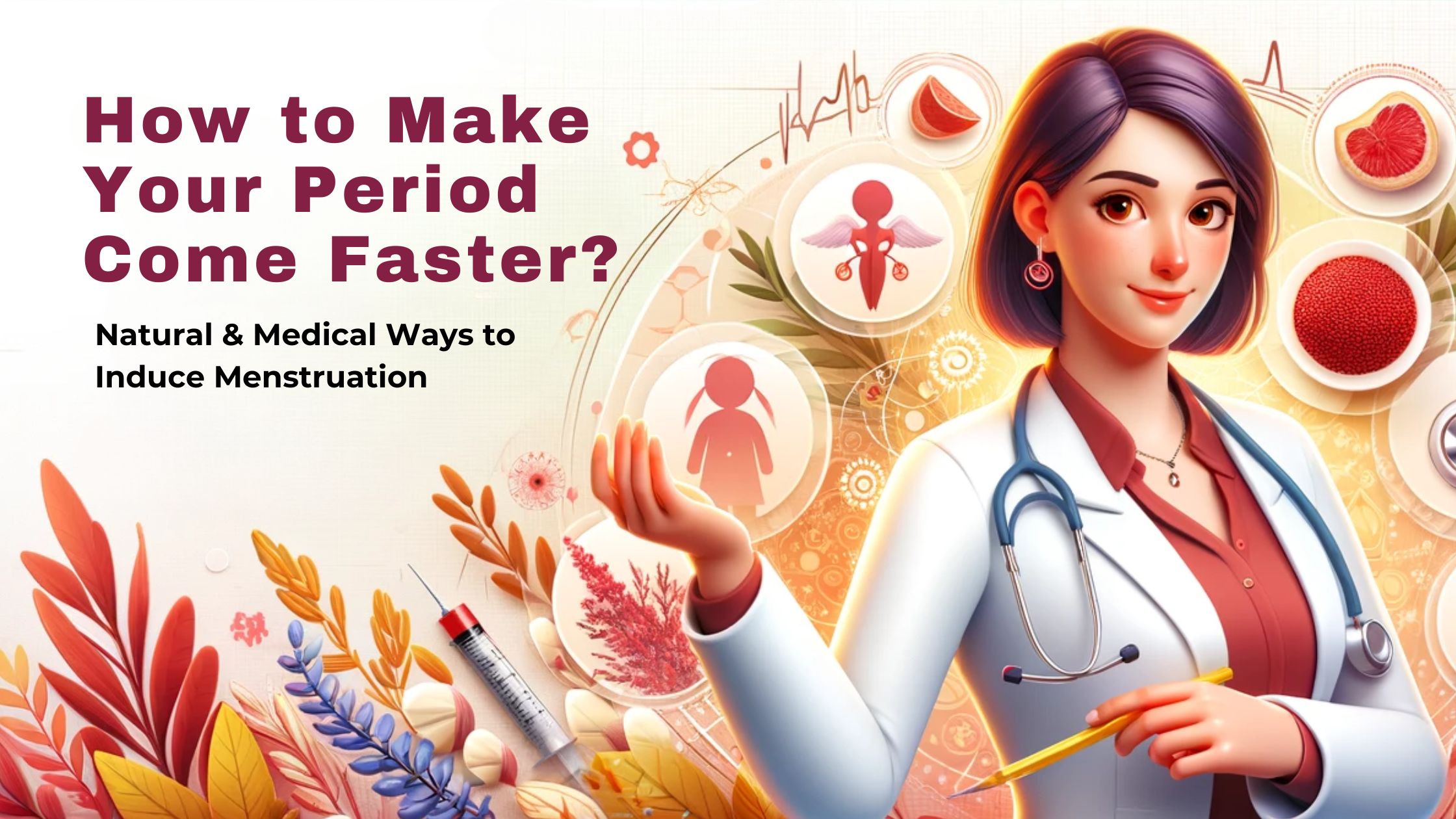Dealing with an irregular menstrual cycle can be a source of significant discomfort and inconvenience.
Many women seek natural and safe ways to regulate their cycle, including methods to potentially induce menstruation early.
This article aims to explore various approaches, both natural and medical, to help women understand and possibly influence their menstrual cycles.
Understanding the Menstrual Cycle
The menstrual cycle is a complex process regulated by hormones in the female body. It typically spans 28 days, though it can vary from woman to woman.
The cycle is divided into phases: menstruation, the follicular phase, ovulation, and the luteal phase.
Hormonal balance plays a crucial role in maintaining a regular cycle, with estrogen and progesterone being the key hormones involved.
Our article on ‘Shilajit Benefits for Females‘ provides insightful information on natural supplements that can support overall female health, potentially impacting menstrual regularity.
Menstrual Irregularities
It’s not uncommon for women to experience irregularities in their menstrual cycle at some point.
Causes can range from stress and lifestyle changes to medical conditions. Understanding these irregularities is vital for any woman considering methods to induce her period. [Source]
How to Make Your Period Come Faster | Natural Methods to Induce Menstruation
Herbal Remedies for Periods
Herbs have been used for centuries in various cultures for menstrual cycle regulation. Some popular herbs include:
Parsley: Known for its emmenagogue properties, parsley is believed to stimulate menstrual flow.
A study in the National Library of Medicine highlights its use in traditional medicine for inducing menstruation.
Ginger: Often used to alleviate menstrual discomfort, ginger might also play a role in inducing periods.
Its efficacy in managing menstrual pain is documented in a publication by Pain Medicine.
For more comprehensive insights, consider reading about the ‘Health Benefits of Safed Musli‘, which discusses another natural herb known for its health benefits in women.
Dietary Changes
Diet plays a crucial role in hormonal balance and, subsequently, the menstrual cycle. Including certain foods in your diet might help in naturally inducing your period:
Vitamin C-rich Foods: Foods high in vitamin C, such as citrus fruits, can potentially increase estrogen levels and reduce progesterone levels, potentially bringing on menstruation.
Spicy Foods: While there’s no scientific backing, anecdotal evidence suggests that spicy foods might help in inducing periods due to their thermogenic properties.
Physical Exercise
Regular exercise can influence your menstrual cycle due to its impact on hormonal balance.
Both excessive and insufficient physical activity can lead to irregular periods. [Source]
Stress Management
Stress is a well-known factor affecting the menstrual cycle. Techniques like yoga and meditation can be beneficial. [Source]
How to Make Your Period Come Faster | Medical Interventions for Menstrual Cycle Regulation
Hormone Therapy for Period Regulation
Hormonal imbalances can significantly impact the menstrual cycle. In some cases, healthcare providers might recommend hormone therapy to regulate periods. This can include:
Birth Control Pills: Commonly used to regulate menstrual cycles, birth control pills can also be prescribed for inducing periods. They work by balancing estrogen and progesterone levels.
Progesterone Pills: Progesterone therapy can be used to trigger menstrual bleeding in cases of delayed periods. [Source]
Risks and Considerations
While hormonal treatments can be effective, they’re not suitable for everyone and come with potential risks and side effects.
It’s crucial to consult with a healthcare provider before starting any hormonal treatment. [Source]
Lifestyle and Menstrual Health
Importance of Overall Female Reproductive Health
A woman’s overall health significantly impacts her menstrual cycle. Factors such as diet, exercise, and stress management play crucial roles.
Here are some key lifestyle aspects to consider:
Balanced Diet: A diet rich in whole foods, fruits, vegetables, and lean proteins can support hormonal balance and regular menstrual cycles.
The Office on Women’s Health provides guidelines on a healthy diet for women.
Regular Exercise: Moderate exercise can help maintain a healthy weight and regulate hormones.
However, excessive exercise or a significant lack of it can lead to irregular periods.
Menstrual Cycle Tracking
Understanding your menstrual cycle can be greatly aided by tracking.
This can help identify patterns and irregularities. Several apps and tools are available for menstrual cycle tracking, like Clue and Flo. [Source]
Stress Management Techniques
Stress can directly impact menstrual health. Techniques such as yoga, meditation, and deep breathing exercises can be effective in managing stress. [Source]
Conclusion and Emphasizing Safe Practices
Natural Methods: We discussed various natural methods for How to Make Your Period Come Faster like herbal remedies, dietary changes, physical exercise, and stress management as potential ways to influence the menstrual cycle.
Medical Interventions: Hormone therapy, including birth control pills and progesterone pills, was highlighted as a medical approach to regulate the menstrual cycle.
The importance of consulting healthcare providers for such treatments was emphasized.
Lifestyle Factors: The impact of a balanced diet, regular exercise, menstrual cycle tracking, and stress management on menstrual health was explored.
The Importance of Professional Guidance
It’s crucial to emphasize that while these methods may offer potential ways to influence the menstrual cycle, individual experiences and effectiveness can vary greatly.
Always consult with a healthcare provider before trying any new method, especially when it involves hormonal treatments or significant lifestyle changes.
Responsible Approach to Menstrual Health
Understanding and managing menstrual health is a personal journey. While seeking ways to make your period come faster, it’s important to prioritize safety and health.
Avoid unproven and potentially harmful practices. Instead, focus on maintaining overall reproductive health and well-being.
For personalized advice and professional consultations, consider visiting 123 Virtual Clinic to connect with healthcare experts who can provide tailored recommendations based on your individual health needs.
